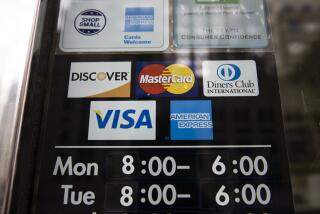Saying ‘Uncle’
- Share via
“To use a — sort of an analogy that families are familiar with, we’re not going to be running up the credit card any more. That’s important — and that’s hard to do. But it’s necessary to do. And I think that the American people understand that.” That was President Obama at his Tuesday press conference talking about his budget plan. He later added, “So, in the same way that if you’ve got a credit card and you’ve got a big balance, you may not be adding to principal -- you’ve still got all that interest that you’ve got to pay. Well, we’ve got a big problem in terms of accumulated interest that we’re paying, and that’s why we’re going to have to whittle down further the debt that’s already been accumulated. So that’s problem number one.”
In keeping with the president’s example, if the federal government applied the Credit Card Act of 2009 to itself, this month’s statement would show an outstanding national debt balance of $14.1 trillion and a minimum monthly payment of $70.5 billion. (For the purpose of demonstration, I’ve calculated the minimum monthly payment at 0.05% — two times the monthly interest rate if the average annual rate is 3% — here and in the accompanying chart .)
The law requires credit card companies to inform borrowers how long it would take to pay off their credit cards if they made only the minimum monthly payments, and how much total interest the borrowers would pay. With the limits on the debt ceiling quickly approaching, we need the same transparency from Washington.
But $14 trillion is too large for most people to comprehend, so let’s divide the debt among all U.S. households to get the more manageable figure of $122,609 shown in the chart.
The average household carries $7,500 in credit card debt. Each household’s share of the federal debt is more than 16 times the average household’s credit card debt.
“But,” you say, “it isn’t my debt. That debt belongs to the federal government.” Wrong. The debt may be an obligation of the federal government, but the federal government gets all of its money from you. So, you are the one who is going to pay this bill.
“No,” you say, “I’m not the only one. Corporations pay taxes too, so corporations will be paying some of this debt.” Wrong again. Where do corporations get their money? From selling stuff to … you. When the government taxes corporations, the corporations pay that tax either by charging customers (that’s you) higher prices, or by paying its workers (that’s you) a lower wage, or by passing on lesser profits to its stockholders (again, that’s you).
In short, Uncle Sam is a lot like a teenager who’s taken his parents’ checkbook, and you’re the parent! Uncle Sam might be signing the checks, but you’re the one who is on the hook if the checks bounce.
The bad news isn’t over. What we’ve seen so far is only the outstanding federal debt. In addition to this, the federal government has promised Social Security and Medicare payments to future retirees that, under current tax policy, it will be unable to pay. The Social Security and Medicare boards of trustees in 2009 reported that, in order to meet all of the obligations the government has promised current and future retirees, Washington needs $50 trillion or so in addition to the future Social Security and Medicare taxes it plans on collecting.
That’s not $50 trillion over time, but $50 trillion in the bank now, the principal and interest from which would help pay for retirees’ promised benefits. If we include these unfunded obligations in the debt, the minimum monthly payment on the federal government’s credit card would be $320 billion, a sum equal to almost one-third of the combined monthly income of all Americans.
Again, the numbers are so large as to be incomprehensible. So think about it this way. Even with every worker contributing half of his or her income to pay off our government’s obligations, it would take almost 10 years to pay off this debt. In 2007, the Congressional Budget Office estimated that the wars in Iraq and Afghanistan would cost a total of almost $9 billion a month. Based on that estimate, just the minimum payment on the government’s credit card would fund more than 35 Iraq and Afghanistan wars, simultaneously, each month.
It’s time that we stop treating Uncle Sam like an uncle and start treating him like an irresponsible teenager. It’s time to take away this teenager’s credit card.
Antony Davies is a scholar at the Mercatus Center at George Mason University and an associate professor of economics at Duquesne University.
More to Read
A cure for the common opinion
Get thought-provoking perspectives with our weekly newsletter.
You may occasionally receive promotional content from the Los Angeles Times.










